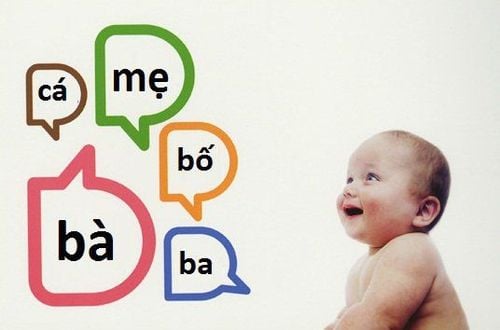This is an automatically translated article.
16-month-olds are smart babies because they're beginning to learn language skills and understand more of the world around them. Children's language and cognitive development is formed naturally in normally developing children, but can be accelerated to develop quickly with parental support.
1. Characteristic of 16-month-olds: Fine-tune skills and cognitive abilities
Parents have seen their children demonstrate their independence in recent weeks and months, but experts say that only when children can talk will they finally know who they are . So does a 16-month-old baby talk yet? A normally developing 16-month-old can say about 7 words on average - or even more - and speak clearly. But at this age, children will still mainly rely on nonverbal communication, using hands and feet and other gestures to show people around them what they want or want others to see.
16-month-old babies understand more than they can say. The challenge for toddlers is not understanding speech, but coordinating lips, tongue, and breathing to make it understandable. Parents may find this out by accident one day, for example, when an adult asks a family pet where he or she might be able to keep the car keys, they catch the child pointing at the keychain. Or you can ask your child to verbally fetch shoes from his shoe closet and watch in surprise as he jogs down the hallway and comes back with his shoes in hand a minute later. Parents don't imagine it - 16-month-olds really understand what other people are saying.

Trẻ vẫn chủ yếu dựa vào giao tiếp phi ngôn ngữ để kết nối với mọi người xung quanh
2. What parents can do to help 16-month-olds develop language and cognition
Children's ability to understand more than they can communicate means parents must speak slowly and clearly to children. Parents may have stopped most of the monosyllabic "a" "e" speech you instinctively used when your child was young, but now parents can start using simple words and phrases to capture attract and maintain the child's attention. Using the correct words to name objects will reduce confusion as your child learns to use words. Listening to children without interruption is also essential at this stage. 16-month-old babies are listened to by parents and caregivers who have good listening skills, thus improving their speaking skills.
3. What do 16-month-olds know?
Daily life is a big adventure for a toddler, including 16-month-olds. Parents may have regularly witnessed children touching, smelling, examining, and at least trying to taste nearly everything they find. By fully investigating all aspects of every object in this way, children can learn to distinguish characteristics and identify many different things. Children will likely find tools - egg beaters from the kitchen cupboards - and living creatures - an earthworm crawling along a drain after a rainstorm - as particularly appealing.

Cuộc sống hàng ngày là một cuộc phiêu lưu lớn đối với một đứa trẻ 16 tháng tuổi
Parents can make these "learning" experiences even more educational by talking to their kids about what they're going through. Name the sounds around your child when he or she is outside: "Did you hear that bird? Can you hear the sprinkler watering the lawn?" for example, or challenge your child to find something specific, such as "Help me find a rock that feels soothing." Learning to observe, listen, and inquire helps children develop important sensory skills.
Although a 16-month-old may not want to sit still for more than a few minutes, she'll probably show more interest if you read to her. Don't get upset if your child seems to prefer pointing to specific pictures and asking you to tell them about them rather than hearing you read the text. One of their favorite things about looking at books might be pointing to objects where they have words - like a ball, a cat, a dog, and so on. and say them over and over again. But if you ask your child to "Find ... the chicken (or the moon, or a car) ..." they will enthusiastically do the same. Your child may also be very adamant about helping to turn the pages, a sign that he is growing in self-control.
For children to be healthy and develop well, it is necessary to have a nutritious diet in terms of quantity and quality balance. If children are not provided with adequate and balanced nutrients, it will lead to diseases of excess or lack of nutrients, which adversely affect the comprehensive development of children in terms of physical, mental and motor skills.
Parents should supplement their children with supportive products containing lysine, essential micro-minerals and vitamins such as zinc, chromium, selenium, and B vitamins to help fully meet their child's nutritional needs. At the same time, these essential vitamins also support digestion, enhance nutrient absorption, help improve anorexia, and help children eat well.
Parents can learn more:
Signs of zinc deficiency in children
Micronutrient deficiency and failure to gain weight in children
Please regularly visit Vinmec.com website and update useful information to take care of your child. Take care of the baby and the whole family.
Reference source: babycenter













